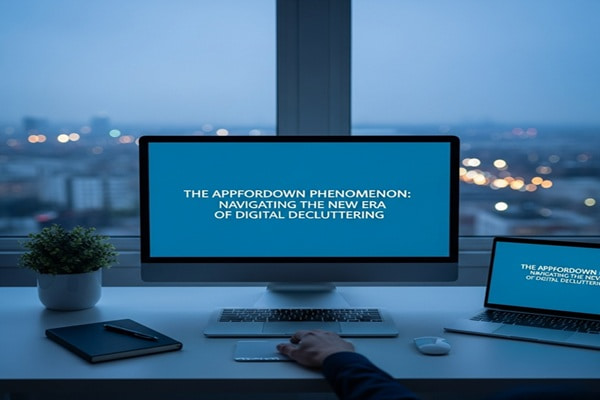We live in a world overflowing with digital choices. Open your phone, scroll through the App Store or Google Play, and you’ll find millions of apps promising to solve every problem, entertain, or connect you with others. For over a decade, the mantra has been: “There’s an app for that.” Our smartphones have become Swiss Army knives, cluttered with icons for every conceivable purpose. “Appfordown”
But a quiet counter-movement is gaining momentum, challenging this idea of digital maximalism. Instead of downloading more apps, the goal now is clear: we need far fewer. Welcome to the era of Appfordown.
What Is Appfordown?
Appfordown isn’t just about deleting a few unused apps. It’s a mindset—a deliberate approach to how we engage with technology.
-
It’s recognizing that constant notifications, endless context-switching, and the mental load of managing hundreds of tiny apps aren’t signs of a connected life—they’re distractions.
-
It’s a collective deep breath, a pushback against digital clutter, and a pursuit of something more meaningful: digital serenity.
Simply put, Appfordown is about intentionally curating your digital ecosystem so it works for you—not the other way around.
Why Appfordown Is Taking Off
Several key trends are driving this digital decluttering movement:
1. Notification Fatigue and Mental Overload
Let’s be honest: our phones have become instruments of interruption. Every ping, buzz, or badge is a demand on our attention, fragmenting focus and increasing stress.
-
From food delivery apps to fitness trackers and news aggregators, our phones are constantly asking for our time.
-
Appfordown is a reaction to this overload—cutting out apps that serve no essential purpose and reclaiming mental space and peace.
2. The Rise of Super-Apps and Integrated Platforms
Why have separate apps for maps, messaging, notes, and weather when one platform can handle it all?
-
Both iOS and Android now offer native apps that are incredibly capable, often reducing the need for third-party alternatives.
-
Super-apps, popularized in Asia via platforms like WeChat, are entering Western markets. With features like payments, mini-programs, and messaging under one roof, fewer apps are needed overall.
3. Distrust of Data Harvesting
Every new app asks for permissions—access to contacts, location, camera, files, and more. With growing awareness of data privacy:
-
Appfordown helps reduce your digital footprint.
-
Fewer apps mean fewer opportunities for data breaches and more control over your personal information.
4. Choosing Depth Over Breadth
The early app boom was all about novelty. Today, users are seeking quality over quantity.
-
Instead of juggling dozens of single-purpose apps, people prefer versatile tools like Notion or Adobe Creative Cloud.
-
One consolidated app can replace several, allowing for deeper mastery and less distraction.
How to Start Your Appfordown Journey
Appfordown doesn’t mean giving up your smartphone. It’s about intentionality. Here’s a practical guide:
1. Conduct a Digital Audit
Go screen by screen through your phone. Be ruthless:
-
Last used: If an app hasn’t been opened in over a month, it’s a candidate for deletion.
-
Purpose: Does it offer unique value, or could a website or native app replace it?
-
Emotional impact: Does it stress you out or bring joy? Apps that cause anxiety—especially certain social media platforms—should go.
2. Prefer Web Apps for Occasional Tasks
For apps you use infrequently, like booking flights or checking stocks:
-
Use your browser instead of installing the app.
-
Use “Add to Home Screen” to create a shortcut that looks like an app without the baggage.
3. Master Notification Settings
For the apps you keep:
-
Turn off all non-essential notifications.
-
Only allow direct messages, calls, or critical alerts to interrupt your day.
4. Embrace Default Apps
Native apps like Mail, Calendar, Notes, and Maps are better than ever:
-
They are optimized for your device, saving battery and storage.
-
They often have tighter privacy controls.
5. Organize With Folders
Group remaining apps into broad categories:
-
Finance
-
Utilities
-
Health
-
Reading
This reduces home screen clutter and encourages deliberate app usage.
The Benefits of Appfordown
Adopting this minimalist app approach offers more than a tidy home screen:
-
Reduced cognitive load: Less switching between apps improves focus.
-
Better privacy: Fewer apps equal fewer data points for tracking.
-
Enhanced productivity: Master the tools that matter rather than flitting between dozens of apps.
-
Mental clarity: A decluttered phone can lead to a decluttered mind.
Appfordown and the Future of Technology
The rise of Appfordown signals a shift in how we relate to digital tools:
-
Developers must adapt: To thrive, apps must offer real value, respect users’ time, and prioritize privacy.
-
Essential vs. disposable: Apps are no longer judged solely on novelty—they must be essential or brilliantly versatile.
-
Digital self-care: Appfordown reframes app management as a form of personal well-being.
By curating your apps, you reclaim control over your attention and time—a modern form of self-care.
Also Read : The Convergence: How eSports is Forging a New Definition of “True Sport”
Practical Tips to Keep Appfordown Sustainable
-
Review monthly: Periodically check your apps for relevance.
-
Combine functions: Use multi-purpose apps to reduce redundancy.
-
Set screen limits: For apps that survived, enforce usage limits to prevent creeping addiction.
-
Reassess notifications quarterly: Needs change over time; adjust accordingly.
Conclusion: Less Is Truly More
Appfordown isn’t a fad—it’s a movement toward a more intentional digital life.
-
By reducing app clutter, you free mental space and focus.
-
You protect your privacy and enhance productivity.
-
You learn to value depth over breadth, mastering fewer, more powerful tools.
Ultimately, Appfordown is about taking control of your attention, your time, and your life. In a world saturated with choice, the real luxury is simplicity.
So next time you open your app drawer, ask yourself: Do I need this, or is it time to hit delete? The answer could change the way you interact with technology—and your peace of mind.
